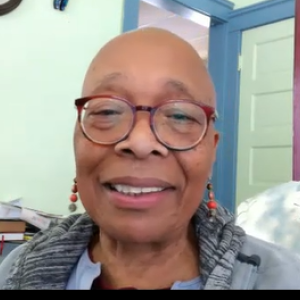For Rita Knight-Gray, the idea that "Knowledge is power" is much more than a popular saying. It's an approach to life.
Through her work as a librarian, archivist, videographer, and community organizer, Ms. Knight-Gray, a long-time resident of Cleveland’s Glenville-University Circle neighborhood, has spent decades ensuring that Clevelanders have the information to empower themselves and their communities.
For the past year, she has also shared her insights as a member of the Cross-Sector Innovation Initiative, a community-led project supported by the CHI Center to understand and address structural racism.
“Information is a big deal,” she explains. “I’ve looked at how it can be misused and abused by businesses and in government, but also how you must use it to bring people together. It's important that people know how to locate the information they need.”
Most recently, she is reaching out to inform and facilitate action in her community. She uses her knowledge and experience in technology, librarianship, and communication, but her approach is simple: it's one neighbor at a time.
“I’m hoping that when COVID breaks, I’ll be able to talk to people in my neighborhood,” she says. “I’m trying to get the community together to get things done, to ensure that local government understands our problems.”
And that means knowing her community.
“The approach isn’t, ‘Come on, we can help you.’ It’s ‘What problems are you having?’ You can't go in without knowing the people that you’re trying to build a community with.”
That belief has guided her own life choices. In 1969, she attended Kent State University not only for an academic education, but also to learn more about the world around her. “Too many people do not know about each other. I hate to say it, but I know more about white people than white people know about me. That’s why I went to Kent. I figured my best bet was to find out about the outside world, so I went to a school where there were only 300 of us [Black students] and 27,000 of them [white students]. That was truly an education.”
In 1970, after members of the Ohio National Guard fired into a crowd of Kent State University anti-war demonstrators, killing four students and wounding nine others, she put her education on hold. She later returned to Kent, first to complete a bachelor's degree in Communications (in 1977) and again for a master's degree in Library Science (Librarian / Archivist) in 2003.
Her varied career has included a stint in Los Angeles trying to break into the film industry and work in numerous libraries. As archivist for the East Cleveland Public Library's Icabod Flewellen Archives, and a widely read student of history, she came to see comprehensive and truthful information as key to understanding the past, present and future.
“Some people have changed history by not including the history of others. That’s how false information is created. A lot of people gather information from what somebody else says, instead of gathering it from that person or the people of that culture.”
If information is key to understanding, so is first-hand experience. Rita Knight-Gray is eminently qualified to bring about change in her neighborhood, because it's a place she knows and understands.
“When people don’t get the help they need, community action might not be their priority. They focus on things they have to take care of. They're likely to say, 'I have to make sure the roof doesn’t leak, I can pay the mortgage, we have food and heat.' Or they’ve been promised certain changes and improvements that never happen, so they continue to lose hope. That’s been happening in my area. People are living their lives separately. And I understand them because I live here.”
“But I’ve seen the neighborhood when there was happiness and joy and kids having parties at each other's houses, and somebody coming over and saying, ‘Your mother’s getting home late, you can eat with us.’ I've been through that, so I know what the possibilities are. I know it can be done."


